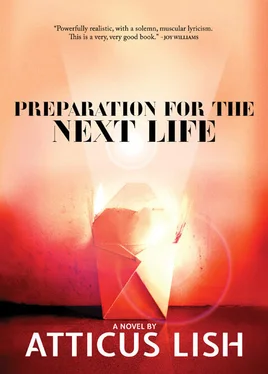You need to take a piss or something?
On the radio, a woman sang: she’s got family pride.
No, said Skinner.
He put his boot up on the dash again.
Are those things comfortable?
Pretty much.
He stuck his thumb in the stitching, pulled at the laces.
They’re holding up all right. But these aren’t my last pair. My last pair got someone’s brain all over them.
The driver looked at him.
Fuckin army took half a year to give me a new pair. Where are we?
Virginia still, I think.
Skinner took a white hexagonal pill with Gatorade. He watched a McDonald’s sign go by. There started to be snow on the hills and it got colder in the cab. He wrapped himself in his green poncholiner, his large tan boots sticking out, his head bent against the edge of the seat, shades still on, pallid sunburned face, large hands with broken nails. He looked unconscious. The driver glanced at him. The sun went in and out like shadow play, like time-lapse photography, something with the clouds.
He slept through Pennsylvania, where his mother and brother lived, and woke to rap music. The sky had changed to gray. He rubbed his face.
The driver turned the radio off.
Slumped, Skinner watched the road, catatonic.
How long you think we’ve got?
Could be a while.
He looked in the trash underfoot and found the Gatorade bottle. That’s all right. Used to do this all the time. He turned sideways, filled it up. I better not see that, the driver said. You won’t. He capped it, put it warm and beer-colored in his assault pack.
They were in the approach to the city for a long time, an identifiable feeling, the road getting worse, fast and narrow and crowded, thudding over breaks in the surface. Graffiti began popping up, a flash of it here and there, and then it multiplied. Skinner lit another cigarette and sat leaning forward, jiggling his foot.
I think you overshot it, dude. It’s gotta be back there.
They swung around west when it was almost sundown. The sky had cleared and they were driving fast along fences, houses, the adjoining highway tapering, disappearing, coming back, dividing. He was searching up ahead. There it is. He saw the famous skyline minus the two towers. It was very distant still and when the highway dipped it went away. Then he saw it again, a precise silhouette, the lava sunset behind it.
The city disappeared behind the roadway, gravel pits, a mountain of sand, the sideways ladder of a crane. A glimpse of a sheet of water. The New York skyline came back. They were close now. Blond hair and tan tits on a billboard. Gentleman’s Club. He rubbed his hands. You catch the address? The driver said nothing.
They barreled down an off-ramp, tenements rising around them like curtains, graffiti on the bricks. The piers of the highway flashed by outside the window. The elevated highway rose above them like an airplane lifting off over their heads. They were subject to the g-force pull of the big rig angling across the lanes, downshifting, cruising, decelerating neatly into a gas station. Airbrakes. Their bodies rocked forward. The driver thumped into low gear and made the rig crawl in next to the pump and when he killed the engine, there was a momentary quiet, though the engine seemed to continue running in Skinner’s head.
This was as far as the driver was taking him, he was told — which was fine, he could see where he was going from here — and they climbed out. While the driver gassed the rig, Skinner went into the convenience store. He went directly to the jerky and pulled a bag of it off the metal tree and got a Red Bull out of the drink case. On his way to the register, he stopped at the magazines. There was a Haitian with blue-black skin reading car ads. Skinner reached across him and took a copy of Ironman, the bodybuilder on the cover holding so much weight the bar was bending and veins were webbed around his screaming neck. Skinner went up to the bulletproof window and dropped his bank card in the tray.
Gimme a pack of Marlboros too.
He went back outside and pulled his bags out of the cab. He shrugged into his camouflage field jacket and flipped his black hoodie over his head. The piss bottle he set by the curb for someone else to have. The driver, in nothing but a t-shirt, was still gassing the rig up. Skinner went over and asked him if he knew the way.
That way somewhere.
Skinner adjusted his pack straps, glanced at the highway. Then he picked up the military duffel at his feet, shook it, held it, gripping it. He looked at it. He did a curl with it. Then he slung it on.
All right. Thanks for the lift.
I don’t mind.
The driver stuck out his hand at the last minute and they shook hands.
Good luck.
Later.
Skinner went around the truck and disappeared.
Now he was cutting through monumental project towers, his silhouette distorted by what he was carrying, a burdened figure moving steadily across the great barren landscape of giant shadows and building structures and cold lights filtering down. A single car was parked against a line of gated storefronts exploding with graffiti — huge, wild, blazing — the letters pumped up like muscles about to burst, like smoke bulging, billowing, swelling in a bubble over the steel and concrete walls, like everything was on fire. He crossed the open area, a solitary figure carrying his gear, and reentered the shadow on the other side.
He was hiking by tenements so small you could reach in a window and put your hand out the door. They were burned-out and boarded-up and there were trash lots. Some of them were lived in. As he traveled, he was feeding jerky into his mouth and chewing. The Red Bull, which he had emptied down his throat and thrown at an oil drum, had frozen him to the core. Now his heart was pounding, his boots were whopping the concrete, steam was coming up from his face, and he was sweating in the cold.
Hey, he said, when he saw somebody and tried to ask them where to go. Papi, they called him. Go there — and pointed towards the traffic lights ahead. Liquor store, groceria, Iglesias de Dios. From somewhere, there was Spanish music. Taillights shot by him and over a bridge. He crossed beneath the highway, in a great tall vault of dark, the steel being knocked by vehicles going over, and climbed pigeonshit-splattered stairs, coming to rooftop level, billboard level — cash for your car — and then he was looking at Manhattan across the black water, a postcard view with all the lights and just the sheer scale of it, the sky violet with energy.
He took his cell phone out and took a picture of it. Steam was rising from his head from charging up the stairs. Then he turned around and took a picture of himself with the Empire State Building lit up laser green above his shoulder. His face was white and distracted in the phone flash.
On the other side of the bridge, which spiraled down into a field, he came to a place where an avenue began, littered and dark, going long and straight for miles and getting brighter as it went, until it became dense with clustered lights in the distance, and he started down it, bent against his weight.
He came to a wall mural of brown people working in the fields, wearing white dresses and straw hats, babies slung on their backs. He passed another mural of portraits of young men and their years of life and death. You Are in Our Hearts. There was a Salvation Army. A block later, he overtook two young women pushing baby carriages over the broken sidewalk, sparkling with broken glass. The Kingdom of the Almighty on a light box sign. A guy came out of a liquor store, wearing a cell phone earpiece, saying: Come uptown and check out what we doing. See how we provide. Skinner passed a fried-chicken restaurant. People moseyed into his way and he went around them. He was remarkably mobile despite the weight he carried, always slipping away and barely noticed in his faded, dusty-looking camouflage and boots, as if he had been doing farm work, head hidden under the black hood.
Читать дальше












